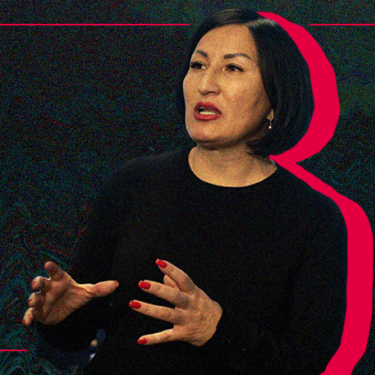Kazakhstan must apologise to journalist who was filmed naked after her arrest

Reporters Without Borders (RSF) calls on the Kazakh authorities to apologise for the degrading manner in which a journalist – who is well-known for investigating corruption and for an iconic photo taken during the January 2022 protests – was forced to remove all her clothes in front of a camera and was filmed naked while detained in a police station.
Read in Russian / Читать на русском
Orda.kz journalist Sandugash Duysenova was subjected to this humiliating treatment while detained on 11 August at a police station in her hometown, Taldykorgan, the capital of the southeastern Zhetysu region.
Duysenova was treated like a criminal and was held overnight after being arrested for an alleged violation of privacy more than a year ago, in which she published personal information about a man who has since been convicted of murder.
The interior ministry claimed that she was treated according to “standard procedure” at the police station, but Duysenova thinks she was targeted because of her work. Her lawyer said her filmed strip search was not the subject of any specific request by the court.
“Sandugash Duysenova is a respected journalist who has investigated corruption in her region and who took an iconic photo of a toppled statue of former President Nursultan Nazarbayev during the January 2022 protests. We condemn the cruel, inhuman and degrading treatment to which the authorities subjected her, violating the UN Convention against Torture ratified by Kazakhstan, and we call for a public apology by the interior ministry and an end to all attempts to prosecute her.
Duysenova was arrested after being placed under investigation on 13 June for an alleged violation of Kazakhstan’s privacy law because, on 22 May 2022, she published information provided by the police about a man suspected of murder. It was this man, who is now serving a 16-year prison sentence, who supposedly brought the criminal complaint against her.
Duysenova was released on bail the next day and the criminal case against her was dropped three days later. But she still faces possible administrative proceedings.
“I was forced to undress twice, the first time in the investigator’s office and then in the cell.” she told RSF. “I was shaken and humiliated. Imagine, undressing in front of strangers and a camera! […] All this is clearly linked to my journalistic activities, because I have recently published many articles about cases of corruption in the region.”
The situation of journalists is worsening in President Kassym-Jomart Tokayev’s “New Kazakhstan.” At the start of July, a court ordered Saryagash-Inform editor Amangeldy Batyrbekov’s detention for 20 days as a result of a defamation complaint by a parliamentarian whose corruption he exposed.
In another case illustrating the hostile climate for the media, an unidentified person snatched the phone of Diana Saparkyzy, a reporter for the KazTag independent news agency on 18 August as she was trying to film the consequences of a fire at an ArcelorMital mine in Shakhtinsk. And, in a steadily deteriorating environment for the media, a new law penalising “fake news” could open the way to censorship when it takes effect on 10 September.
